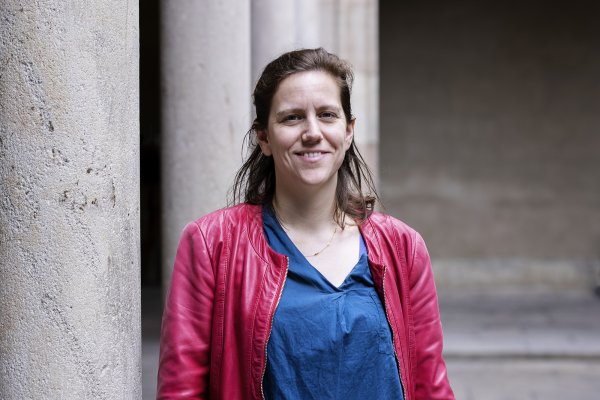The Spanish Royal Physics Society has announced today the “Real Sociedad Española de Física - Fundación BBVA 2023” Physics Prizes. Dra. Carla Marín Benito, a researcher in experimental particle physics at the Institute of Cosmos Sciences of the University of Barcelona (ICCUB) and a Starting Grant awardee to carry out the CLIMB project, has been rewarded with the Young Researcher Award in Experimental Physics.
The jury highlights that her contributions are recognized both in data analysis and in the technologies that have been used to improve the LHCb experiment. Her contributions have been fundamental to the development of the rare baryon decay program, providing complementary sensitivity to potential new physics effects and the development of new instruments. In this context, the leadership of large work teams is valued.
"For me, this award is a recognition of the work done since I started my doctorate, from a technical point of view, but it also gives value to the topics I have focused on, specifically the studies of rare baryon decays and the development of algorithms for the reconstruction and selection of events in real-time, which are crucial to be able to make the measurements. It is also a prize shared with all the people who have accompanied me these years, especially my thesis directors and supervisors during the two post-doctorates. I have been fortunate to always work with people who have given me full support and encouraged me to overcome obstacles and go further no matter how difficult the projects I proposed to them seemed", says Dra. Marín Benito.
Dra. Marín Benito obtained a PhD in Physics at the University of Barcelona in 2018 and continued her career with two postdocs, first at the Laboratoire de l'Accélérateur Linéaire (Orsay, France) and later at CERN (European Council for Nuclear Research). Since 2021 she has been a lecturer at the University of Barcelona.
Her research is framed in high-energy experimental physics, with the aim of experimentally testing the Standard Model, the current theoretical framework that describes fundamental particles and their interactions. Despite describing the results of the experiments with high precision, this model is not capable of explaining all the phenomena we observe in nature, such as the asymmetry between matter and antimatter, and is therefore incomplete. Her research focuses on the study of the properties of particles formed by a b quark, using data from the LHCb experiment, one of the main ones at CERN, where she is currently responsible of the Real Time Analysis project, including the online event selection (trigger), alignment and calibration, and reconstruction of the data.



